Amazonian Indigenous Leaders Call for Suspension of Construction License for Belo Monte Dam
FOR IMMEDIATE RELEASE
Photos and Broadcast Quality Video Available Upon Request
Altamira, Brazil - Indigenous leaders representing six tribes affected by the Belo Monte Dam complex along the Amazon’s Xingu River sent a letter today to President Dilma Rousseff and other government authorities calling for immediate suspension of the controversial project’s Installation License. The letter – signed by more than sixty indigenous leaders from 16 villages and endorsed by some of Brazil’s leading human rights and environmental groups – describes how dam construction has raced ahead, while legally-required measures to mitigate and compensate the project’s impacts have not been implemented by the government-led consortium Norte Energia.

The indigenous leaders, representing the Xikrin, Juruna, Arara, Parakanã, Kuruaya and Kayapó tribes, are leading an occupation by approximately 300 people at the main earthen coffer dam that cuts across channels of the Xingu River. The occupation began on June 21, in the midst of the Rio +20 conference, halting construction at the site. The majority of the occupiers come from a region of the Xingu downstream of Belo Monte that will suffer from a permanent drought provoked by the diversion of 80% of the river’s flow into an artificial dam to feed the powerhouse.
The indigenous leaders are demanding that construction on the project be halted until Norte Energia and the government can put in place effective programs and measures to address the impacts of the dam on local people. Such impacts include loss of fishing and hunting resources, loss of river navigation and access to Altamira for healthcare and education, and increased incidence of diseases. Today, seventy Xikrin Kayapo leaders arrived in Altamira for a second series of talks between the indigenous communities and Norte Energia.
According to community leaders, key examples of violations of legally-binding requirements that warrant cancellation of the Installation License include the following:
- Lack of completion of studies on the project’s impacts on the Bacaja River and local Xikrin villages located downstream on the Xingu that were not included in the original environmental impact assessment (EIA) due to intense political pressures to fast-track dam approval and construction;
- Absence of a completed plan to mitigate and compensate impacts of the project on indigenous peoples and their territories known as the PBA (Plano Básico Ambiental) that should have been finalized and formally approved prior to granting of the installation license for Belo Monte by the federal environmental agency, IBAMA, in June 2011.
- Lack of a promised system to ensure small boat navigation in the vicinity of the coffer dams to avoid isolation of indigenous peoples from Altamira (where there is a market for goods and the main source of healthcare, schools and other essential services). The interruption of boat transportation along the Xingu is expected to force indigenous peoples to open up access roads to their villages, provoking further pressures from illegal loggers, land speculators, cattle ranchers and squatters.
- Lack of legal recognition, demarcation and protection of several indigenous territories in the area of influence of Belo Monte, such as the Apyterewa, Cachoeira Seca and Arara of the Big Bend, and Juruna of km 17 territories, as well as removal of illegal intruders – all legal prerequisites for dam construction,
- Absence of improvements in health and educational services in indigenous villages, also required by FUNAI as a condition for approval of environmental licenses.
According to the Xikrin and other indigenous leaders, the coffer dams at Pimental have already compromised water quality downstream on the Xingu due to siltation and stagnation, making it undrinkable and unsuitable for bathing. Norte Energia promised to install wells and potable water distribution systems in indigenous villages, but no such works have been carried out.
The demands of indigenous leaders, as communicated in the letter to President Rousseff and other Brazilian authorities include: the immediate suspension of the Installation License for Belo Monte; FUNAI and IBAMA to refrain from authorizing an extension of coffer dams on the Xingu River; and respect for the rights of indigenous peoples to free, prior and informed consultations about the Belo Monte project, in accordance with Article 231 of the Brazilian Constitution, ILO Convention 169, the Inter-American System of Human Rights and the UN Declaration on the Rights of Indigenous Peoples.
The letter concludes that “the current state of lawlessness is intolerable in a democratic society with respect for the rule of law. The government must act now to ensure respect for the law and democratic institutions that protect the rights of all Brazilians, especially those most threatened and impacted by Belo Monte”.
- Brent Millikan, +55 61 8153 7009, brent@internationalrivers.org
- Atossa Soltani +55 93 8804 4490 or +55 93 9183 2485, atossa@amazonwatch.org




